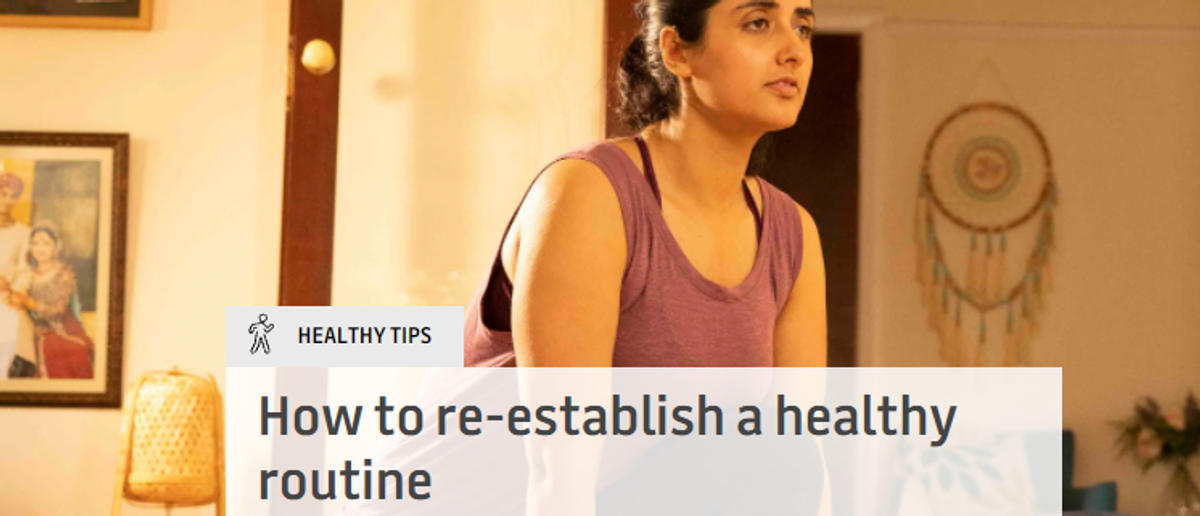Wellbeing Matters
October 2021

Wellbeing Matters
October 2021
Adapted from https://www.nhs.uk/every-mind-matters/coronavirus/tips-to-cope-with-anxiety-lockdown-lifting
As the state slowly eases restrictions you may be experiencing a mixture of feelings as opportunities to resume “normal” life increase. Some people have been desperately waiting for these changes to come while others may be feeling apprehensive about things going back to normal. While some may be initially welcoming the increased freedoms, they may find it challenging once they occur. Change can often be hard so here are some tips to help your young person navigate the change from lockdown to eased restrictions.
Fear and anxiety are normal and healthy emotional responses to new and unusual situations. It’s important to acknowledge Victorians, especially, have endured lengthy, strict lockdowns which have taken an emotional toll. By checking in with yourself, and those you love, you can normalise the range of feelings you all may be experiencing i.e. excitement to reconnect with friends and family, sadness that things are changing and there will be less time to be at home, worry about what it will be like to be back at school/work, anger for all the time spent in lockdown, fear for your own or the safety of your friends or family.
The foundation for wellbeing always remains important; making sure you are getting enough sleep, enough exercise, good nutrition and a mix of relaxation and fun activities ensure that you are in the best state to face change. In the weeks and days leading up to the return to school, take some time with your young person to prepare i.e. getting back into good sleep habits, preparing their school bags and items they’ll need, asking them how they’re feeling and what they need to prepare.
Help them to think about the things they can control, and the things they can’t. Encourage them to take things at their own pace, but support them to slowly face things they may be wanting to avoid completely. If something seems overwhelming, try breaking it down into smaller steps. Assist them to build up their tolerance by trying something that challenges them every day or every few days. Make sure you reflect on the little wins, as well as the big ones. Reflect on the positive coping skills you’ve seen them use and have conversations about others they could try.
If you or your child are finding the idea of returning to school difficult, try spending some time talking about it when you are both calm and relaxed. Having conversations about what they are feeling, without trying to problem solve is often helpful for young people. Sometimes they just want to express how they feel. You may like to ask if there’s anything you can do to help them. They may not know, and that’s okay. Sometimes, they need an opportunity to come up with their own solution and that may take some time, days even. If they are concerned about their school work, explore what they could do. Support them to generate their own solutions, but if needed, you can ask if they want suggestions from you. Help seeking from a teacher or year level leader is encouraged.
If they’re feeling apprehensive about their health and safety, or the health and safety of others around them, make sure they are accessing reliable information sites, such as government websites, to get information about coronavirus and the best measures to keep themselves and others safe. Wearing masks, practicing good hand hygiene and social distancing help to keep us all safer.
Support them to reconnect with friends at their own pace. Talk with your young person about how they’re feeling and whether they have any worries. They might find themselves comparing their own feelings to others. Remind them that they don’t need to share other people’s excitement or apprehension.
Make sure they are still making time to relax and connect with themselves. Talking with them about their thoughts and experiences gives them an opportunity to reflect and challenge some of their unhelpful thinking. Looking at the positive things they have enjoyed or gained while in lockdown or thinking about some of the activities that they are looking forward to, helps foster a positive mindset.
As a parent, young people may want to come and debrief, but not always when you expect it. Create space for talking in different ways by going on walks or doing activities, such as cooking or baking together. Young people often feel less pressure to have conversations when not directly face to face. Don’t assume they are okay because they seem fine or because they aren’t saying there is a problem. Checking in with them periodically helps to plant the seed for communication and shows them that you care.
Ultimately everyone will adjust to this change differently. Some will take it in their stride while others will need more support to move through it. Ensure you are looking after yourself and reaching out for help as you need too. Living through unprecedented change stretches us in ways we couldn’t have anticipated or prepared for. It’s the building ground for resilience.
If you or your young person need more support, feel free to contact the School Health and Wellbeing Coordinator, Romy Glenn.
Alternatively, you or your young person may also like to access the following:
Lifeline: 13 11 14
24 hour phone counselling for all ages
Kidshelpline: kidshelpline.com.au
1800 55 1800 – 24 hour phone and web counselling for young people 5-25 and a range of resources for young people and parents
Q Life: 1800 184 527
3pm-12am LGBTI phone and webchat, peer support and referral
Headspace: headspace.org.au
(Greensborough Office – 9433 7200)
Mental health appointments with qualified mental health professionals for young people
Beyond Blue: beyondblue.org.au
information and resources for parents and young people
Reach out: reachout.com
information and resources for parents and young people
Head to Health: headtohealth.gov.au
mental health resources and information
So, it is time to ease back into a routine that we can cope with. This article is from the VicHealth website. There are some good tips on getting started.
How to re-establish a healthy routine (vichealth.vic.gov.au)


Humans are creatures of habit, so after our normal daily routines are disrupted it’s a great idea to look at how you can back on track and get back into exercise on the regular. So how do we get back on track? How can we re-establish healthy routines when they’ve been lost?
Any coronavirus information mentioned is accurate at the time this article was originally published (6 December 2019, updated 27 May 2021). For the most up-to-date information about coronavirus restrictions, please visit the source: www.coronavirus.vic.gov.au
If you’ve been finding it hard to get back on track when your daily routine has been disrupted, you’re not alone. The good news is, there are simple, actionable steps you can take to fit exercise into your home and work life.
Here are Dr Sandro Demaio, VicHealth CEO's top tips for baking exercise into our daily lives.
In this article you'll learn:
How to create sustainable and healthy exercise routines
Tips on how to bake exercise into your daily life
Tips to for the best daily routine for a healthy life:
Exercise is very important to keep us healthy and well, so it’s a great place to start when working out the best daily routine for a healthy life. Here we take you through 6 simple steps to creating sustainable and healthy exercise routines.
Look for simple swaps to
build healthy habits
Take the stairs instead of the lift. When catching public transport, such as a tram, train or bus, get off one stop early and if your visiting places such as shopping centres, park your car at the back of the carpark so you can walk.
Here’s more on getting into active travel
Do a little more often
Don’t have time for a 30-minute exercise class or long walk? That’s ok! A 10-minute workout or jog around the block is better than nothing. Search apps like YouTube to find a wide range of high and low intensity exercises and choose one that suits your energy level that day. Don’t hesitate to break up your 30 minutes of exercise into 10-minute sessions throughout the day.
Remember to focus on how exercise and movement makes your feel rather than a target on the scales. You can also find some fun and simple exercise videos on our This Girl Can Victoria webpage here.
Forget the ‘go hard or go
home’/ ’no pain no gain’ motto
It’s time to forget the old clichés you’ve heard about exercise. We know there are incredible benefits of moving your body in a way that suits you and feels great. Instead of looking at exercises that make you feel sore or burnt out, find ways that help you feel calm, connected, or balanced.
These could include:
Yoga, you can even do this on your office chair
Dancing to your favourite song
Try bush walking
Most of the time, if you find a way to exercise or be active in a way that feels good, you’re more likely to do it. Find something you enjoy and have fun doing and you’ll be more likely to stick at it.
Make it easy
When you get started, don’t put pressure on yourself by comparing your goals to others, and set small goals that fit your routine. Daily exercise should improve your overall mental and physical health, not cause burnout.
If you have a busy schedule, choose workouts that don’t require you to leave the house. If you enjoy working out early in the morning, get your exercise gear and gym bag packed and ready before you go to bed so it’s ready to go when you wake up.
Start small
Avoid going too hard too soon – this will only result in burnout and fatigue. Start exercising in small doses. This could be in the form of locking in a short walk daily or participating in an online exercise class. Make sure you take the time to acknowledge each step you make because every small step is getting you closer to your goal.
Although there are many ways we can re-establish routines, daily exercise is a good place to start. Once this foundation has been set, it will be easier to assess other important areas such as food and sleep.
Find a fitness buddy
Sometimes exercise is more fun – and motivating – when you have someone by your side. You can try some of the above tips with a member of your household or share them with your friends to get motivated.
You’re more likely to get up for that early morning walk if you have an exercise buddy you don’t want to let down.
What does VicHealth CEO Dr Sandro Demaio recommend doing to re-establish exercise into your routine?